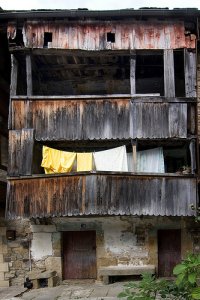Discover Villacarriedo in Spain
Villacarriedo in the region of Cantabria with its 1,711 habitants is a town located in Spain - some 194 mi or ( 313 km ) North of Madrid , the country's capital .
Local time in Villacarriedo is now 10:22 AM (Sunday) . The local timezone is named " Europe/Madrid " with a UTC offset of 1 hours. Depending on your flexibility, these larger cities might be interesting for you: Nantes, Bordeaux, Vitoria-Gasteiz, Vega, and Santiurde de Toranzo. When in this area, you might want to check out Nantes . We found some clip posted online . Scroll down to see the most favourite one or select the video collection in the navigation. Are you looking for some initial hints on what might be interesting in Villacarriedo ? We have collected some references on our attractions page.
Videos
Mercado Valles Pasiegos III
Mercado de Los Valles Pasiegos. www.vallespasiegos.org Realizado en Selaya ( Cantabria ) 7, 8, y 9 de Agosto de 2009 organizado por la Mancomunidad de los Valle Pasiegos en esta ocasión contó con la p ..
Casa Rural la Charruca
Casas rurales con spa en Villacarriedo, Cantabria: Casa Rural la Charruca Más información del local en: www.brujulea.net ..
Vega de Pas, Spain [Travel with Manfred]
Vega de Pas is a famous mountain village in Cantabria on the river Pas. It is home of the delicious sweet pastry "Sobaos" dating back to the 16th century. The village has a central square, surrounded ..
Tudancas I
Summer 2010. Lloreda de Cayon, Cantabria ..
Videos provided by Youtube are under the copyright of their owners.
Interesting facts about this location
Engaña Tunnel
The Engaña Tunnel (Spanish: Túnel de la Engaña) is a never-completed railway tunnel in Spain, connecting the provinces of Burgos and Cantabria through the Cantabrian Mountains. The tunnel was part of the proposed Santander–Mediterranean railway line, an attempt by the Spanish government to connect the Bay of Biscay with the Mediterranean Sea. The construction lasted for over seventeen years, from 1941 to 1959, employing hundreds of workers, including Republican prisoners during the first years.
Located at 43.12 -3.74 (Lat./Long.); Less than 14 km away
Cabarceno Natural Park
The natural park is located in Cabárceno, Pisueña Valley 15 kilometres from Santander, located in a former iron mine removal in the town of Cabárceno Township Penagos. The park belongs to Cantur, a public company to promote tourism under the Government of Cantabria. Cabárceno park develops two roles: one related to the conservation of endangered species and the other one related to environmental education.
Located at 43.35 -3.85 (Lat./Long.); Less than 14 km away
Cueva de La Pasiega
Cueva de La Pasiega, or Cave of La Pasiega, situated in the Spanish municipality of Puente Viesgo, is one of the most important monuments of Paleolithic art in Cantabria. It is included in the UNESCO schedule of Human Heritage since July 2008, under the citation "Cave of Altamira and palaeolithic cave art of Northern Spain.
Located at 43.29 -3.97 (Lat./Long.); Less than 14 km away
Cave of El Castillo
The Cueva de El Castillo, or the Cave of the Castle, is an archaeological site within the complex of the Caves of Monte Castillo, and is located in Puente Viesgo, in the province of Cantabria, Spain. This cave was discovered in 1903 by Hermilio Alcalde del Río, the Spanish archaeologist, who was one of the pioneers in the study of the earliest cave paintings of Cantabria. The entrance to the cave was smaller in the past, but it has been enlarged as a result of archeological excavations.
Located at 43.29 -3.97 (Lat./Long.); Less than 14 km away
Caves of Monte Castillo
The Caves of Monte Castillo, located in the Cantabrian town of Puente Viesgo, contain one of the most important Paleolithic sites in the region. The complex of caves of Monte Castillo is included in the list of World Heritage of UNESCO since July 2008, within the site «Cave of Altamira and Paleolithic Cave Art of Northern Spain». These include the caves Las Monedas, El Castillo, Las Chimeneas, and La Pasiega.
Located at 43.29 -3.97 (Lat./Long.); Less than 14 km away
Pictures
Related Locations
Information of geographic nature is based on public data provided by geonames.org, CIA world facts book, Unesco, DBpedia and wikipedia. Weather is based on NOAA GFS.


